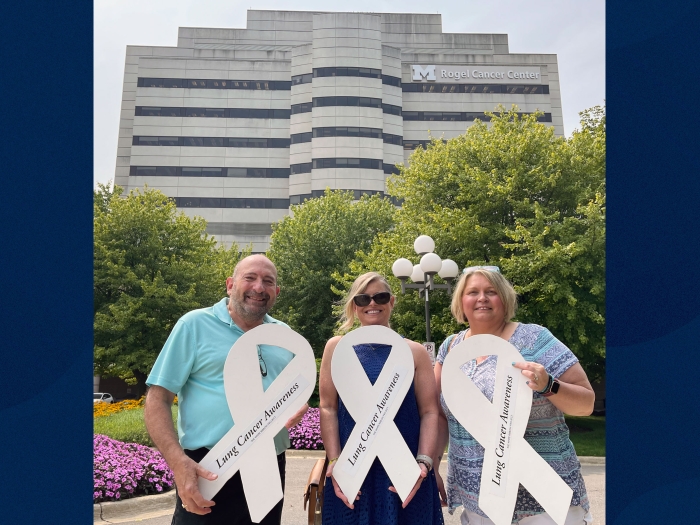The free hospital service provided 'peace and comfort'
5:00 AM
Author |
For Cathy Eisenberg, the time she spent at University Hospital felt dark and interminable – four long months sitting at her daughter’s bedside, hoping for a recovery that never came.
“When Julie was first admitted, we didn’t think this was the end, but unfortunately it was,” said Cathy, when discussing the journey of her 42-year-old daughter, who passed away last fall.
“But through it all, we kept having hope on even the worst days. And part of that was thanks to those who came to our bedside – especially those from the Gifts of Art Bedside Music and Art Program. It truly gave us peace and comfort during a horrible time for our family.”
Bringing life into the room
Julie Eisenberg was admitted through the emergency department at U-M Health on June 29, 2022. She was diagnosed with fatty liver disease and anemia, but that was only the beginning of her challenges.
Once admitted, Julie encountered kidney failure needing dialysis, blood transfusions and reoccurring sepsis. That kept her in the hospital for more than four months.
“She was a fighter the entire time,” Cathy said.
But she had others in the ring with her. Her mother, husband, families and friends, of course, but also the doctors, nurses and other staff members on her unit.
And, possibly most importantly, the team behind the Bedside Music and Art programs.
“About a month into our stay, Sam [Vandiver] came to our room and played his guitar for us. It just brought life into the room,” said Cathy, who mentioned that Julie played and loved music her entire life.
“His playing brought life into the room.”
Artists with Bedside Art also brought art projects for Julie to work on, giving her yet another creative outlet.
“Art and music helped Julie forget for just a few minutes that ‘I’m sick.’ They were so important to us,” Cathy said.
Musicians and artists on staff
The Bedside Music program consists of musicians specially trained in providing acoustic music for patients at the bedside.
Vandiver, who coordinates the program, plays the guitar, as do several other musicians. But team members also play the harp and other stringed instruments.
“We will go wherever patients, families and staff members need us,” said Vandiver, who added that his team will play in patient rooms, during dialysis treatments, infusions, and even just in the hallways so that team members can get a brief moment of calm in an otherwise exhausting day. They will play requests or come in with their own set list in mind.
“Our music is meant to help you relax. And that relaxation is so important to the healing process of patients, but also to preventing burnout among faculty and staff,” Vandiver said.
In much the same way, artists bring projects to work on to provide a moment to respite.
It’s all part of the holistic healing process offered at Michigan Medicine.
“I don’t know if we would have gotten through this horrible time without the help of Sam and other musicians and artists,” Cathy said.
That’s why her family set up a fundraising effort after Julie’s passing to benefit the Gifts of Art Bedside programs.
“I’m not sure all patients, families or staff members even know about this program,” Cathy said. “But they should. It was the most important thing to us for four months and, for that, we’ll always be thankful for everything they do.”
Get more information on Gifts of Art and how to request their services.
Learn more about Cathy and Julie’s journey, and the Bedside Music Program, in the video above.

Explore a variety of health care news & stories by visiting the Health Lab home page for more articles.

Department of Communication at Michigan Medicine
Want top health & research news weekly? Sign up for Health Lab’s newsletters today!





